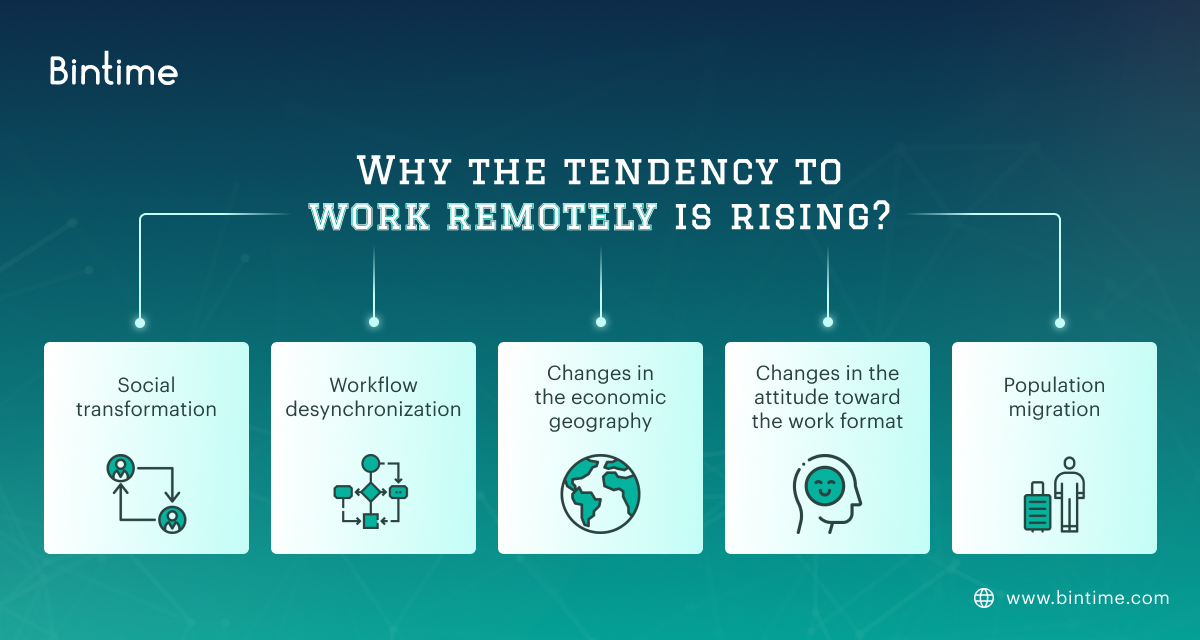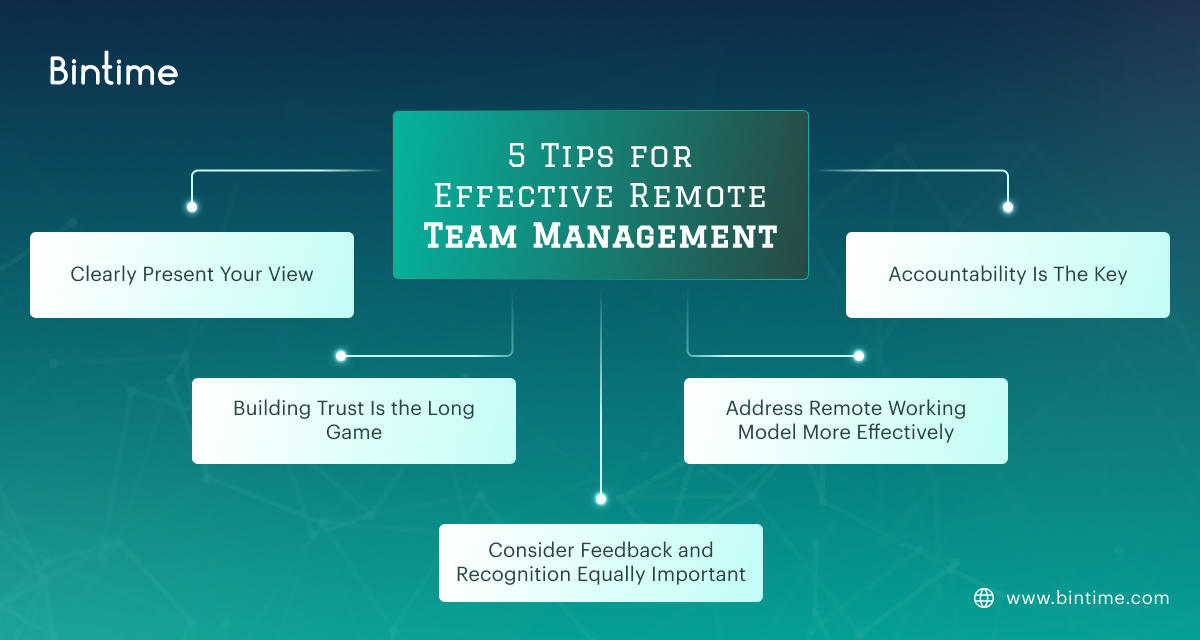Remote team management is a key element when we’re talking about any sort of development. Without any doubt, if the team has a great leader — that’s half of the success already. Of course, you can always hire a team of professionals, but what would they do having no real leader to help to figure out how to achieve the goal in the best way possible.
Remote staff management requires an even bigger amount of skills and expertise, as you’re literally supposed to support the team through the screen, having everyone separated to some extent. COVID-19 made us re-evaluate our tendencies and approaches, so a lot of things had to be learned right in the process, making mistakes and finding ways to fix them. So, it is really important to cover the main points, and in this article, we will try to shed some light on this complicated mission.
What is Remote Work?
What is remote work? In the last few years, we have all had the opportunity to get to know this working style, but a lot of people still continue to work this way. First, it is a lifestyle. People have more control over their own lives, balancing work and personal things. They can easily travel the world, working from the most remote parts of Earth, and be productive, motivated, and inspired. Remote work support is at the highest levels now, as companies can save a lot of money on rent, utility bills, etc. while having their employees perform even better.
The Next Step for Remote Work
A certain proportion of employees have already been working remotely for years. The COVID-19 pandemic in 2020 impacted the world, forcing most companies to either shut down completely or change their work format. The COVID survey shows that only 16% of companies worked remotely before the pandemic. Twice as many expect to continue practicing telecommuting after the corresponding limitations are canceled. And more than 70% are currently working remotely.
But this transition to telecommuting during the pandemic was comparatively modest. And Adam Ozimek, a labor economist working remotely via Upwork — the freelancing platform, confirms the significance of the forthcoming global changes.
How Exactly the Prevalence of Telecommuting Will Affect the World

The potential consequences of the rising tendency to work remotely are the following:
- Social transformation.
For now, remote staff management issues include a lack of understanding and planning. People have very little control over their lives: if they move to another city — it is only within driving distance, as they’re still feeling obligated to stay close to their office.
Once humanity will figure this out, changes will rapidly touch the geographical aspects, the density of the cities. People would be choosing where they want to live based on their personal preferences (ecology, infrastructure, cultural aspects, etc.).
- Workflow desynchronization.
Remote-oriented startups are the ones that are making the biggest changes so far. Adam Ozimek believes that they would be able to come up with new ways for asynchronous work, making fully remote positions more manageable than the ones we are used to right now.
- Changes in the economic geography.
Croatia decided to go further, creating a village for digital nomads. For €520/month, you get an apartment close to the sea not far from the historical part of Zadar — a port city in the center of Croatia, with access to the various events hosted in the village.
- Changes in the attitude toward the work format.
According to the statistics shown in Global Workplace Analytics, 56% of the workspaces are compatible with remote work, but only 3.6% are actually WFH half-time and more. What’s interesting is that 80% of employees prefer to work remotely at least from time to time, and a third of them don’t mind a pay cut in order to enjoy this opportunity.
But how does it feel to manage people who are far away from you? In the beginning, working with remote teams may feel like you’re being thrown into the deep end.
Challenges of Managing Remote Employees
Every month, more and more people are switching to remote work, so the tendency is only progressing. It requires a different set of skills, so various challenges of managing remote employees include:
- Inability to switch from remote to traditional work.
The first one requires way better time management skills, and the ability to follow pre-written procedures and communicate appropriately. Onboarding is a great solution: it gives an understanding of the rules and values of the company, even if the person never had such an experience before.
- Not knowing what to expect.
It is critical to have a clear picture of the working process. Even though the remote style implies a flexible schedule, employees have to know about all communication and meetings, and the vision of the process from the manager’s side. It is smart and productive to have the rules so that everyone knows what they’re expected to do.
- Lack of communication.
When you’re sitting in the office, you’re always immersed in the conversations amongst your colleagues, but how to collaborate effectively if your team is remote? Employees may feel isolated and lonely, so managers have to wisely arrange communication within the team — everyday conversations/discussions, off-topics, regular meetings.
- Trust issues.
If the team is incorrectly organized, there’s no way people would trust each other. This means that the company should revise its hiring policy. Every member should be treated equally well, focusing on collaboration and engagement.
- Low productivity.
Some people are finding it really difficult to work with no supervision. They lack motivation, and productivity, so the main task of the manager is to build the processes that way, so everyone knows what they should do. Time and task tracking are great helpers, so no need to neglect them.
5 Tips for Effective Remote Team Management
So, what should a team manager do to ensure their remote team is working at its best? Here are some key team management tips to clear the picture.

- Clearly Present Your View
We talked a lot about remote work issues already, but how to manage remote teams correctly? It is really important to have every aspect clarified for every member. Remote work best practices include sharing goals, vision, mission, and expectations from the members for maximum productivity. - Building Trust Is the Long Game.
Trust is crucial when it comes to any kind of collaboration. In the long run, it increases productivity, quality of cooperation, and interpersonal relationships. It doesn’t take much to establish communication within the team:- Occasional virtual get-togethers would be a great idea to distract the team and speak on some day-to-day topics.
- Encourage team members to share their views and ideas, and discuss the ways to implement them — this is a great opportunity to show the potential of each individual.
- Virtual team activities are great helpers when it comes to communication — just make sure that all participants are active and no one is left out.
- Organize small group tasks and brainstorms, where all the employees would be able to make efforts to bring the results.
Contact Bintime Partner Manager to know more about ways to build trust with employees and get the necessary assistance.
- Consider Feedback and Recognition Equally Important. A lot of issues occur when the management has no idea what’s going on within the team. Underestimation of the feedback is a huge drawback, so constant communication is a must. But as we advance in technologies really fast, now we have more than enough instruments to keep in touch with remote workers. They include Microsoft Teams, Google Hangouts, ClickUp, Peopleforce, and Slack.This way, if a problem occurs and there’s a need for communication — it’s really easy to organize (both written or via audio/video) in a matter of minutes. Issues get solved really fast, feedback is being shared constantly, and everyone’s always aware of their development vectors.
- Address Remote Working Model More EffectivelyRemote team management tips won’t be full without us mentioning that management should direct most of its forces to make the remote working model work. A lot of managers mention that they’re constantly struggling to put things into action because you have only your digital devices to handle everything. But in the new reality, we must make this thing an advantage, not the opposite. So, these are the key elements to succeed:
- Constant communication within the team. It should be voluntary, not pushing anyone to it. This way, everyone’s going to be heard, maximizing efficiency.
- Tracking of time and tasks must be present. Trust is always a good thing, but we’re all humans, and unless we have control over the situation — we cannot guarantee its success. Nowadays, we have more than enough software to alleviate the process (Jira, Trello, Smartsheet, etc.). Thus, the team doesn’t feel like their every step is being watched, but at the same time, everything’s under control.
- Wellness activities should also take part in the working process. Even a casual conversation and “Have a great day” in the chat would be a great move from management.
- Ask the team their opinions, listen to their ideas, play a role in their implementation — this is really important if we’re talking about healthy relationships within the team.
- A good manager should always encourage its subordinates, giving them opportunities to balance their work and life.
- Accountability Is Key
The more “at place” every member is within the team, the more productive the entire team would be. You hire a person for their skill and expertise, so it’s really significant to give them enough space to do what they’re good at. It is especially crucial in terms of remote work. Managers must find a method to measure accountability, working for the team, and holding everyone, even team leadership, to the same standards. For example: on the project, there’s an entirely new technology, and you give a task to the developer who has never worked with that one before. How soon do you expect them to finish the task? Have you discussed it with your colleagues? Maybe someone would be more willing or experienced?Contact Bintime Partner Manager to know more about ways to improve remote team management and get the necessary assistance.
Remote Team Management FAQ
How to motivate a remote team?
You can keep the team motivated in many ways. They include fostering a growth mindset, introducing to the recognition program, giving regular feedback, strengthening team relationships, and increasing awareness of growth opportunities. Applied all together, they can bring awesome results, and as a bonus — you’ll get your dream team.
How to find remote employees?
If you cannot meet the person in real life, you can still know who’s in front of you. It is really important to check shared values and views at the very first interviews, all of them MUST be with the camera on, so you have a fuller picture. Paying more attention to the CVs and cover letters is really helpful, as they’re giving you the first impression, which then may turn out to be correct.
It’s great if you have a dedicated HR specialist, but if not, websites like Upwork and LinkedIn will help you find reliable team members.What are the best communication tools for remote teams in 2022?
If we’re talking about written communications with remote employees, the absolute leader would be Slack, as everything you need is already integrated there. Zoom, Microsoft Teams, Google Hangouts — are great for every purpose; you just have to determine your goals and expectations, look up some info on the software, and make your decision
What’s Next for Remote Team Management?
Managing a remote team might be tricky, as you are to trust your digital devices in guidance fully. This is what makes the position of remote team manager challenging. But once you know how to deal and what to expect — life gets easier. And with the right strategies, you can always have your team aligned and on maximum productivity without even thinking about their location.
So, let’s create your dream team in the upcoming months! Here you have the chance to talk about the topic with the Bintime Partner Manager — don’t let this deal go to waste!
Contact Bintime Partner Manager to know more about the future of remote team management and how you can achieve maximal productivity.











